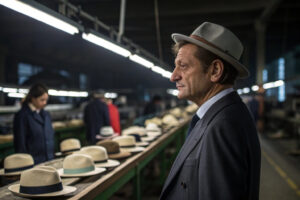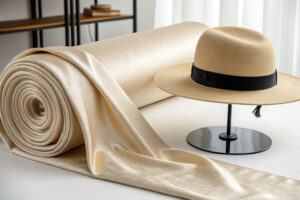As winter approaches, retailers and brands face the annual challenge of selecting the right beanie lineup. You're likely weighing cost against quality, trying to predict what will truly satisfy your customers beyond the first wear. The market is flooded with cheap acrylic options, but they often lead to disappointed customers and missed repeat sales. The real question isn't just about warmth; it's about offering a product that delivers lasting value and enhances your brand's reputation for quality.
Merino wool beanies are worth the investment because they provide superior temperature regulation, exceptional moisture management, and long-term durability that cheap synthetics cannot match. This natural fiber offers a unique combination of comfort, performance, and sustainability, leading to higher customer satisfaction, fewer returns, and the ability to command a premium price point. It's an investment in product quality that pays dividends in customer loyalty.
Understanding the specific advantages of Merino wool can transform your winter accessories collection from a basic commodity into a high-performance, sought-after line. Let's explore the science behind this remarkable fiber and how it translates into tangible benefits for your business and your customers.
What Makes Merino Wool Superior to Synthetic Fibers?
The core of Merino wool's value lies in its natural fiber structure, which man-made materials struggle to replicate. When customers buy a beanie, they're seeking comfort and protection from the cold. Acrylic and polyester beanies often trap sweat, feel clammy, and can develop odors quickly, leading to a poor user experience that reflects badly on your brand.
Merino wool's secret is its inherent biomechanical design. Each fiber has a natural crimp that creates insulating air pockets, while the outer layer is covered in protective scales. This structure allows it to absorb moisture vapor without feeling wet, wick it away from the skin, and release it into the air. Unlike synthetic acrylics that can feel stiff and plastic-like, Merino is exceptionally soft and non-itchy, even against sensitive skin. This superior performance in temperature regulation ensures the wearer stays dry and comfortable, preventing the chill that comes from sweat accumulation in standard beanies.
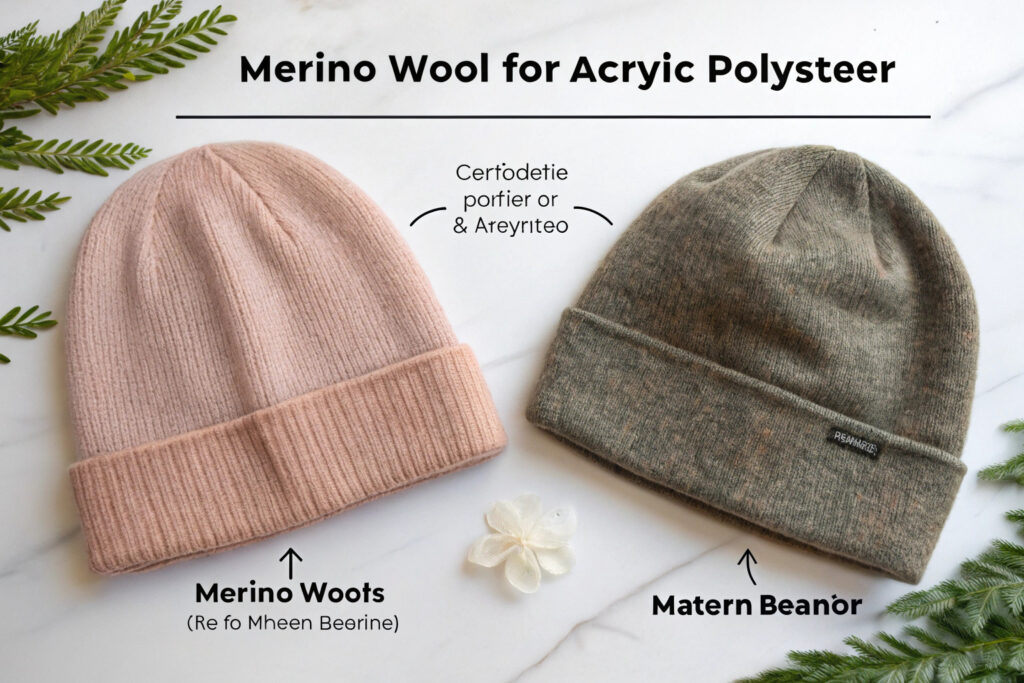
How Does Merino Wool Regulate Temperature and Moisture?
Merino wool's temperature regulation is an active process, not just passive insulation. This is a crucial differentiator that justifies its higher price point to your customers.
The fiber can absorb up to 30% of its own weight in moisture from the skin without feeling damp. As your body heats up during activity, the wool pulls sweat away as vapor. When you slow down and your body cools, the wool slowly releases this moisture. This dynamic process maintains a stable micro-climate around the head, which is responsible for a significant amount of the body's heat loss. Furthermore, because it absorbs moisture rather than repelling it, it doesn't produce the static cling common in dry, synthetic materials. This makes Merino beanies ideal for a wide range of activities, from casual wear to high-intensity winter sports.
Why is Merino Wool Naturally Odor Resistant?
For a beanie, which is worn close to the skin and hair, odor resistance is a major selling point that directly impacts how often a customer wears and values your product.
Merino wool possesses natural anti-microbial properties. The core of the fiber absorbs moisture, creating an environment where odor-causing bacteria cannot easily thrive. Additionally, the protein structure of the wool fiber (keratin) naturally binds with and neutralizes odor molecules. These molecules are then released only when the beanie is washed. This means a customer can wear a Merino wool beanie for multiple days between washes without the embarrassment of unpleasant smells, a clear advantage over synthetic alternatives that often require frequent laundering. This longevity between washes also significantly extends the garment's overall lifespan.
How Does Merino Wool Enhance Customer Satisfaction?
Investing in Merino wool is ultimately an investment in your customers' experience. A satisfied customer is a repeat customer, and they are more likely to trust your brand for future purchases. A beanie that performs well, feels comfortable, and lasts for seasons creates a positive, lasting impression of your entire brand.
The direct benefits customers experience include consistent comfort without itchiness, reliable performance in varying conditions, and a product that maintains its appearance over time. This leads to positive online reviews, word-of-mouth referrals, and a lower rate of returns. Because Merino wool is a natural and renewable resource, it also aligns with the growing consumer demand for sustainable products, allowing you to tap into the valuable eco-conscious market segment. This enhanced brand perception justifies a higher retail price, improving your profit margins per unit.

What Are the Long-Term Durability Benefits?
The initial cost of a Merino wool beanie is higher, but its cost-per-wear makes it a smarter financial decision for both you and the end-consumer.
Merino wool fibers are naturally elastic and can be bent over 20,000 times without breaking, compared to the much lower fatigue resistance of synthetic fibers. This inherent resilience means the beanie retains its shape wash after wash, season after season. It resists pilling and thinning, maintaining a like-new appearance far longer than a cheap acrylic beanie that can stretch out and become misshapen quickly. This long-term durability is a key quality indicator that reduces customer complaints and solidifies your reputation for selling reliable, long-lasting goods.
How Does Merino Wool Meet Modern Sustainability Demands?
Sustainability is no longer a niche concern; it's a mainstream purchasing driver. Merino wool provides a compelling story that resonates with today's consumers.
Merino wool is a completely natural, renewable, and biodegradable fiber. Sheep grow a new fleece every year, making it a sustainable resource. The production process generally has a lower environmental impact than the petroleum-based manufacturing required for synthetics like acrylic. By choosing Merino wool, you are offering a product with a lower carbon footprint, which is a powerful marketing message. This allows you to connect with a growing demographic of environmentally aware shoppers who are willing to pay more for products that align with their values.
What Should You Look for in a Quality Merino Wool Beanie?
Not all Merino wool beanies are created equal. To ensure you are sourcing a product that truly delivers on the promise of this premium fiber, you need to understand the key specifications and construction techniques that define quality.
The most important factors are the wool grade (micron count), the yarn weight, the knitting technique, and the finishing. A lower micron count (e.g., 17.5-19.5) indicates a finer, softer wool. The yarn weight and knit density determine the beanie's warmth and structure. Look for reinforced stitching, particularly in the seam, and quality finishing on the cuff and crown. A well-made beanie should feel substantial but not heavy, soft but not fragile, and should recover its shape instantly after being stretched.
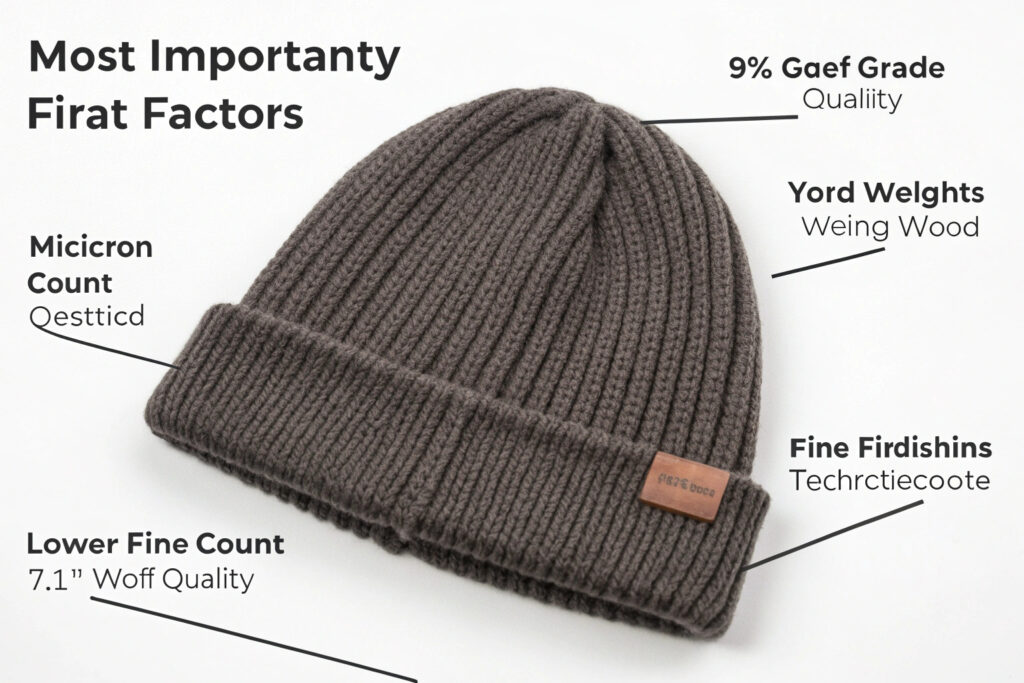
How Does Micron Count and Wool Grade Affect Quality?
The micron count is the diameter of the individual wool fibers, measured in microns (one-thousandth of a millimeter). This is the single most important factor determining the softness and potential itchiness of the final product.
| Micron Count | Grade | Softness & Best Use |
|---|---|---|
| 17.5 - 19.5 | Ultra-Fine | Extremely soft, ideal for sensitive skin and premium luxury beanies. |
| 19.6 - 22.0 | Fine | Very soft, the standard for high-quality, everyday performance beanies. |
| 22.1+ | Medium | Good durability, can be slightly coarser; often used in rugged outdoor styles. |
A lower micron count means a finer, softer fiber that feels luxurious against the skin. For a beanie worn directly on the forehead and ears, opting for a grade of 22.0 microns or lower is crucial for comfort. Reputable suppliers will provide certification to verify the wool grade, ensuring you get what you pay for.
What Construction Details Ensure Durability and Fit?
The way a beanie is constructed is as important as the material itself. Poor construction can undermine the benefits of even the finest Merino wool.
Look for a ribbed knit brim, which provides elasticity and helps the beanie stay securely on the head. The main body should have a consistent, dense knit that traps heat without being bulky. The seam, often at the crown, should be flat-locked or seamlessly knitted to prevent irritation and create a clean aesthetic. Some manufacturers use a blend with a small percentage of nylon (e.g., 85% Merino Wool / 15% Nylon) to significantly enhance durability and abrasion resistance without compromising the natural feel of the wool, a technique common in high-performance apparel.
How Can You Source Merino Wool Beanies Effectively?
Finding a reliable manufacturing partner is key to bringing a high-quality Merino wool beanie to market. You need a supplier with expertise in handling this specific fiber, from sourcing the right yarn to executing the precise knitting techniques required.
An effective supplier will offer transparency about their wool supply chain, provide samples for your assessment, and have a proven track record of consistent quality control. They should understand the importance of social compliance and environmental standards, which are increasingly important to global brands and consumers. The right partner will help you navigate options like fabric weight, blends, and construction to create a product that meets your specific market needs and price point.
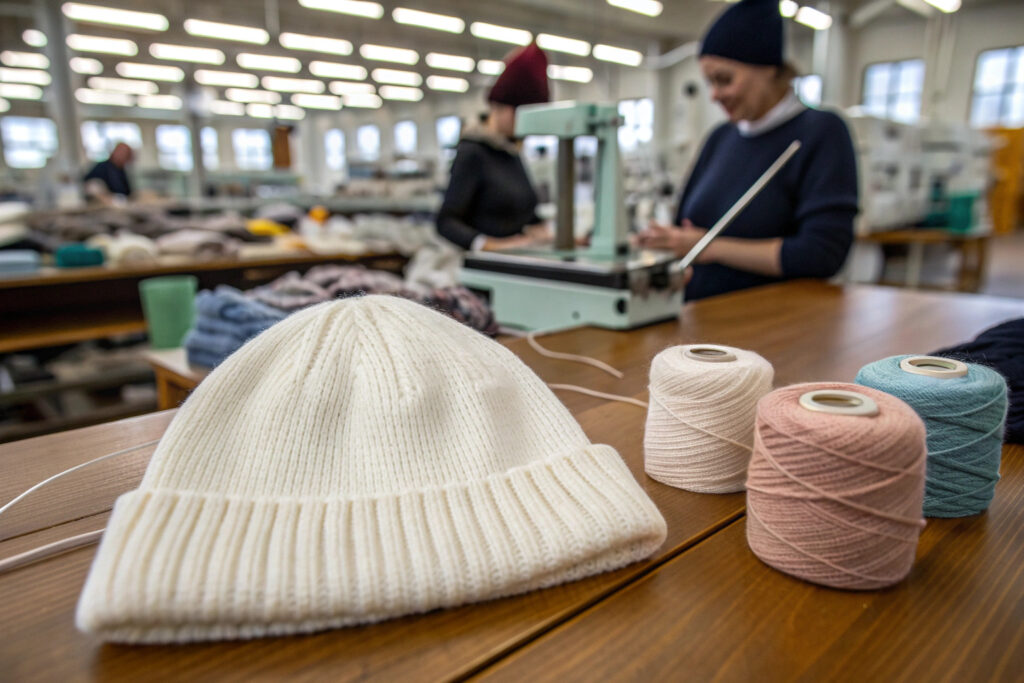
What Quality Control Measures are Essential for Wool Knits?
Robust quality control is non-negotiable for maintaining the integrity of your Merino wool products. Each batch must be checked for consistency in color, weight, and dimensions.
Key QC checks include testing for colorfastness to washing and light, shrinkage resistance, and seam strength. The pilling propensity should also be tested using a method like Martindale to ensure the beanie will maintain its appearance. A professional supplier will have a CNAS-accredited lab or equivalent to conduct these tests, providing you with data-backed confidence in the product's performance. This due diligence prevents costly batch failures and protects your brand's reputation.
How to Navigate Logistics and Lead Times for Wool Products?
Sourcing a natural material like wool requires careful planning and an understanding of the supply chain dynamics.
Lead times can be longer than for synthetic products due to the raw material processing (scouring, spinning, dyeing) and the more meticulous knitting process. It's crucial to work with a supplier that has strong relationships with spinning mills and a reliable logistics framework to ensure timely delivery. A partner with experience in global export can help navigate shipping and customs, especially for orders destined for markets in the EU and North America, ensuring your seasonal products arrive in time for the selling period.
Conclusion
Merino wool beanies represent a strategic upgrade for any headwear collection. The investment is justified by the fiber's unparalleled performance, superior comfort, and alignment with modern sustainability values. This translates directly into higher customer satisfaction, stronger brand perception, and better long-term profitability through repeat business and premium pricing.
By understanding the technical advantages of Merino wool and partnering with a manufacturer who masters its nuances, you can offer a product that truly stands out in a crowded market. If you are ready to develop a premium beanie line that your customers will love season after season, we have the expertise and supply chain to make it a success. For a detailed discussion on our Merino wool capabilities and to request samples, please contact our Business Director Elaine at elaine@fumaoclothing.com. Let's create winter accessories that define quality and comfort.





